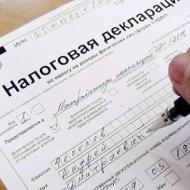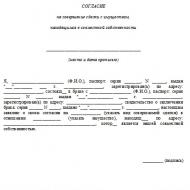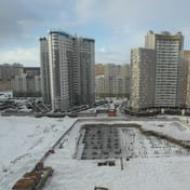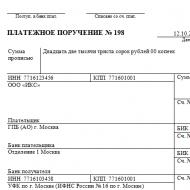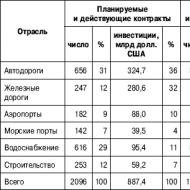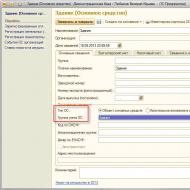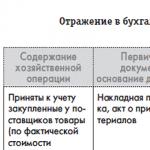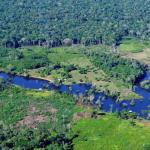
What is a policy and why did it arise? The emergence of the Greek polis. Transformation of policies into states
The period of formation of the polis covers two historical eras in the history of Ancient Greece - Homeric and Archaic, that is, the time from the 11th to the end of the 6th century. BC. When studying the processes that took place at this time, it is important to keep in mind that the foundations of Greek civilization and the polis system were formed not from the decomposition of “pure” tribal relations, as in almost all previous societies, but on a more complex basis, which included both rich critical the Mycenaean heritage, as well as the new achievements of the Homeric era, as well as the fact that the development of Greek society occurred at a more advanced stage of all human civilization.
The main reasons that brought the policy to life, and at the same time the factors of its initial development and formation, were:
- 1. External factor. The development of Greece at this time occurred without outside interference: clashes between the ancient eastern powers, which abounded in the first half of the 1st millennium BC, delayed the intervention of eastern despotism in Greek affairs for a long time.
- 2. Social wisdom ancient Greeks, expressed in the unique struggle of the main part of the community (demos) with the clan nobility (aristocracy). There were no winners or losers in this struggle, but a unique social compromise was reached, in which both sides agreed to a new social order provided by foreign slaves. Although the demos crushed the dominance of the aristocracy, it itself made concessions to the bearers of the principles of nobility and wealth, thanks to which the principles of legality and harmony were established in society.
- 3. Natural conditions. The landscape of Greece and the absence of large rivers on the Balkan Peninsula did not require the creation of a strong central government with a large administrative apparatus directing the entire economic life. The Mycenaean palaces with their bureaucracy remained only an episode and were swept away by the Dorian invasion, so communities in Greece developed independently, without pressure and interference in their economic, social and public life.
- 4. Iron. Its development and widespread distribution coincided with the designated period of the formation of the policy. The use of iron created the preconditions for the emergence of a more complex economy, dynamic commodity production, which set a faster pace of economic and social development than conservative subsistence farming. Iron literally revolutionized the entire economic and social life towards individualization and democracy: in the economy - towards the development of a viable economy of small and medium-sized peasants and artisans, and in the socio-political sphere - towards strengthening the military power and political role of the militia, farmers armed with iron weapons -hoplites, who replaced the aristocratic cavalry.
- 5. Great Greek Colonization. This unique historical phenomenon was generated by the development of the emerging policy and became one of the most important factors in the spread of the policy throughout the world, as well as one of the ways to resolve internal problems. Thanks to colonization, the Greeks were able to defuse the tense social situation and ensure a balance between the size of the population and the size of the territory in which this population could exist.
The transition of Greek society from a tribal system to a polis system took place along three main lines, which were closely interconnected:
- 1. from a rural communal settlement to a city, as a trade, craft, administrative, cultural and religious center;
- 2. from the decaying late-clan society to the class society of the ancient type, in which the civil collective was clearly distinguished from the mass of powerless slaves and incomplete foreigners;
- 3. from the power of local king-basileus, based on a narrow layer of the tribal aristocracy, to a proper democratic state governed directly by the sovereign people - citizens.
The mechanism for the formation of policies, or rather, the formation of the initial structure for their subsequent development, was most often carried out through synoicism, that is, the resettlement or forcible unification of all or a significant part of the inhabitants of a given area into one large, more fortified and more viable settlement. Thus, in Athens, an example of synoicism is the unification of the tribes living in Attica around the Acropolis. The ancient tradition attributed this unification to the legendary Theseus. Sometimes, at an intermediate stage, rural communities were united, which subsequently did not develop into cities. Such an example is provided by Sparta, which remained a union of 4 villages that never became a city throughout classical antiquity.
Another way of forming a polis was associated with colonization and conquest, when the original polis, as it grew, brought out a number of daughter colony settlements, from which independent polis were subsequently formed.
During the VIII-VI centuries. BC. on the Balkan Peninsula, in the Aegean basin, the Black Sea region and the Western Mediterranean, a total of several hundred policies arose with more or less similar socio-economic structure, principles of political governance and a system of spiritual values. Each of the policies was unique, had its own history and its own specific features, but they all had common properties, which allow us to talk about the policy as a phenomenon of ancient history.
The process of policy formation lasted a total of half a millennium. The period of disintegration of this organism was no less long. In fact, the history of the polis is synonymous with the history of all antiquity.
After the Dorian conquest, the Greeks actually began from the very beginning to rebuild their world, which had been destroyed. The Greeks not only lost all their foreign trade relations, culture and art, they were on the verge of the worst - writing began to be forgotten.
They were essentially left to their own devices: there was no way to earn money for food. The only way out was to engage in farming in order to have the basic things necessary for life - food and clothing.
Prerequisites for the emergence of Greek city-states
Greek farmers united in small villages, which were called policies. The decline of Greece ended immediately after the introduction of iron in the 8th century BC. Iron tools increased agricultural productivity.
Peasants were given the opportunity to sell surplus production in markets. Greek artisans also began to sell their iron products. The rise in trade created the need to build new ships to enter the Mediterranean market.
For convenience in trade, the Greeks created their own coin. Greece was able to become the center of trade in the Mediterranean region in a fairly short time.
Thanks to their brilliant mind and ability to learn quickly, Greek sailors and traders were able to master the languages of many countries, which had a very beneficial effect on their commercial activities.
Transformation of policies into states
Such a tangible economic boom turned the Greek city-states, which until recently were more like villages, into powerful states. Each policy had its own independence.
The polis included a main city and many small villages that surrounded it. The indigenous inhabitants of the city, who had private property land plots, had the status of citizens and had a number of political rights: to take part in city governance and military battles.
Polis occupied a small territory and were usually few in number. They were built mainly on hills, the top of the hill served as a place for the construction of religious buildings, and the foot – for the houses of the inhabitants of the policy.
In most policies there were constant conflicts between the common population and the nobility in matters of city governance, but in very rare cases they developed into hostility.
Great Greek Colonization
Demographic and the economic growth policies made the Greeks want to expand their territories. The only solution was the colonization of lands. The Greeks did not experiment with unexplored settlements and decided to take away colonies from Phenicia.
By that time, the Greek fleet had already begun to push the Phoenicians out of the Mediterranean. Greek troops were able to capture virtually all the settlements belonging to Phenicia.
It is noteworthy that they did not go deeper into land, but colonized only cities located on the coasts of the Gulf of Corinth, the Mediterranean, Black and Ionian Seas.
All Greek city-states took part in the great Greek colonization, with the exception of Sparta. Proud Spartans believed that they had no right to enslave other peoples.
1. What were the reasons for the emergence of ancient civilization?
In the 8th-6th centuries BC. Greece has surpassed all neighboring countries in its development. Appeared ancient civilization. The ancient Greeks became skilled shipbuilders and sailors, trade and crafts developed, writing and silver and copper coins appeared. They adopted the Phoenician alphabet and added vowels to it. Some modern alphabets are derived from the Greek alphabet. Greek science emerged. The Greeks settled on the islands of the Aegean Sea and on the western coast of Asia Minor; they adopted a lot from their neighbors, the states of Dr. East. Also, there were no wars; this entire civilization arose in peacetime.
2. Explain what a policy is. When did policies originate? What Greek policies do you know?
Mountains divide Greece into small areas, and there are many small islands in the Aegean Sea. Therefore, the policies were small in size and limited in territory. The policy included the city, which became the center of the state, and nearby villages. The upper city, or acropolis, is the central fortified part of the city. The Acropolis was not only a fortress, but also a sanctuary where temples stood. Next to it at the foot of the hill there was a market square - the agora. It also hosted public meetings. Athenian polis, Sparta, Miletus. 8th-6th centuries BC
4. Name the reasons and show the areas of the Great Greek colonization.
Because there was little fertile land in Greece, and the country's population was rapidly increasing. The best lands belonged to the aristocrats. They could collect for debts land from the demos, and whoever lost land in this polis also lost civil rights. Therefore, many left to become citizens of the new policy or to feed themselves. There were 2 main directions of Greek colonization: to the northeast (in the Black Sea region) and to the west (along the Mediterranean Sea). In the Black Sea region, the major colonies were Olbia, Chersonesos, and Panticapaeum. In a western direction - Syracuse, Tarentum, Massilia (modern Marseille in France).
5. What is the name of the political system of Athens? What is the name of the government of Sparta? Why are they called that?
Athenian democracy and the Aligarhic system in Sparta. In Athens, the demos wrested power from the aristocracy. All citizens of the policy were recognized as equal. The Council of 500 played an important role. It included 50 people from each phylum. These were essentially electoral districts. The aristocracy no longer played a role in them. The main role passed to the people's assembly. A government system Sparta was oligarchic. Oligarchy is the power of a few. The popular assembly did not play a significant role in Sparta. All issues were resolved by the Council of Elders. They were chosen for life from among the Spartans at least 60 years old. Also. The Council of Elders included two kings, whose power was inherited in two Spartan families. The kings had only two votes in the Council of Elders, and therefore the general decision did not depend on them. The People's Assembly was convened only when necessary. They voted by shouting; the one for whom they shouted loudest was considered elected.
Story
5 - 9 grades
What is a policy, how and when did it arise?
2. How did the Greek polis differ from the states of the Ancient East?
3.What were the reasons for the Great Greek Colonization?
4. In what polis did democracy arise?
5. How to prove that there was democracy in Athens, but there was none in Sparta?
HISTORICAL AND MYTHOLOGICAL CHARACTERS.
What events in Greek history are associated with the names Miltiades, Themistocles, Pericles, Alcibiades, Demosthenes?
Who said:
“Hector, having killed Patroclus, were you going to live?”
“Know, Cyclops, that you were blinded... by the famous ruler of Ithaca!”
"Rejoice, Greeks, we have won!"
"I will prove to them that I am alive!"
“There is no city wall that a donkey loaded with gold cannot pass through.”
“If I were Alexander, I would agree!”
"I don't steal victories!"
CULTURE.
Poet, participant in the Battle of Salamis.
Famous sculptor who supervised the construction of the Athenian Acropolis.
The famous doctor, after whom the doctors' oath is named today.
Philosopher who argued that the world consists of atoms.
Greek freedom fighter, whom the Greeks considered their best speaker.
Famous philosopher, teacher of Alexander the Great.
"Father of History".
What names of sciences are Greek? Why did it happen so?
Why are the Olympic Games so named and why are they held every four years in our time?
Where does our alphabet come from? Which ancient people invented the alphabet? How did the Greeks improve it?
Please help please
The word polis means city, but in Ancient Greece there were not just cities, but city-states. They grew up in rural communities. Therefore, the city was surrounded by arable land that belonged to farmers - citizens of the city-state. Residents managed the policy together. All critical issues the people's assembly decided, even where power was in the hands of aristocrats. Polis were often at enmity with each other. But there was no need for professional soldiers: the citizens themselves defended their state and their land. And most importantly, they had political rights (the poor had less, the rich and nobles had more), and therefore could participate in government. Outsiders - metics - were allowed to settle in the city, but they were not allowed to buy land. Metics were not considered citizens, even if they managed to get rich by engaging in trade or usury.
Ostracons are clay shards on which Athenian citizens wrote the names of those they considered enemies of their polis. If more than 6,000 ostracons were accumulated, the person exposed had to leave Athens for 10 years.
Expulsion from one’s native city was considered a terrible misfortune. Citizens felt themselves to be full, free people and believed that the well-being of everyone depended on the well-being of everyone. They were proud of their state, revered traditions and peasant labor. They valued noble, talented people. 
This is what the agora might have looked like, the main square of the ancient Greek polis, on which there was often an altar for sacrifices and a statue of the god - the patron of the city, a politician or a famous athlete. Here you could buy food, exchange money, buy slaves - they were sold on a special platform called the kikle.
The Greeks loved to compete and were sure that competition was good for them. common cause- it encourages a warrior, a poet, a craftsman, a statesman, an athlete to show their best qualities. The Greeks not only highly valued the human personality, but also made great demands on it. A truly beautiful person, they believed, is beautiful both physically and spiritually. Therefore, he must be a patriot of his homeland, fearless in battle, have a sense of proportion and self-esteem, control his emotions, be able to enjoy art and music, and take care of the health and beauty of his body.  This coin depicts Themistocles, the famous Athenian figure who built the powerful fleet that allowed the Greeks to defeat the Persians at the Battle of Salamis (480 BC). Nevertheless, Themistocles was later ostracized and expelled from his hometown.
This coin depicts Themistocles, the famous Athenian figure who built the powerful fleet that allowed the Greeks to defeat the Persians at the Battle of Salamis (480 BC). Nevertheless, Themistocles was later ostracized and expelled from his hometown.

